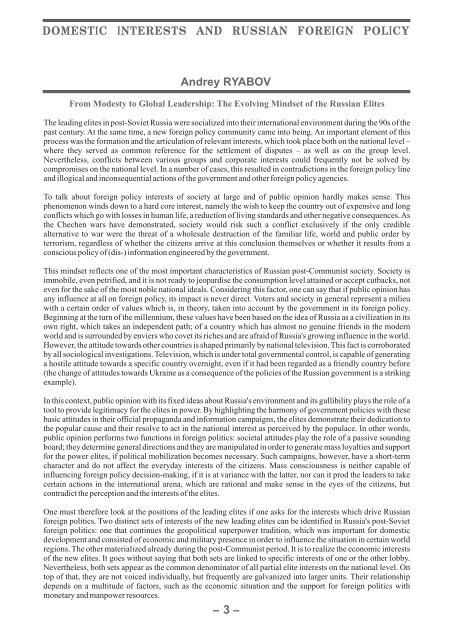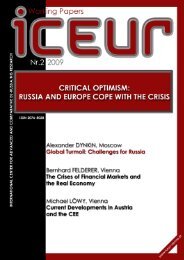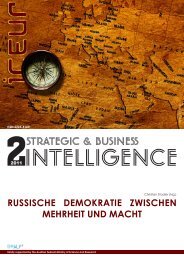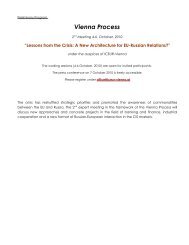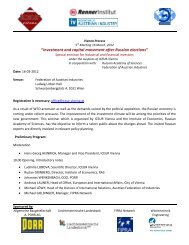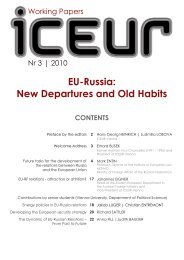International Center for Advanced and Comparative EU-Russia
International Center for Advanced and Comparative EU-Russia
International Center for Advanced and Comparative EU-Russia
You also want an ePaper? Increase the reach of your titles
YUMPU automatically turns print PDFs into web optimized ePapers that Google loves.
DOMESTIC INTERESTS AND RUSSIAN FOREIGN POLICYAndrey RYABOVFro m Modest y to Globa l Leadership: The Evolving Mindset o f the <strong>Russia</strong>n ElitesThe leading elites i n post-Soviet Ru ssia were socializ ed int o their internationa l environme nt during the 90s of th epa st century. At the same time, a new <strong>for</strong>eign policy community came into being. An important element of thisprocess was the <strong>for</strong>mation <strong>and</strong> the articulation o f relevant interests, which took place both on the national level –where th ey served as commo n reference <strong>for</strong> the settlemen t of disputes – as well as o n the group level.Nevertheless, conflicts be tween various groups <strong>and</strong> corporate interests could frequently no t be solved b ycompromises o n the national l evel. In a number of c ases, this resu lted in contradictions in the <strong>for</strong>eign poli cy line<strong>and</strong> illo gical <strong>and</strong> inconsequential actions of the government an d other <strong>for</strong>eign poli cy agencies.To tal k about <strong>for</strong>eign policy interests of society at large <strong>and</strong> of public opinion hardl y makes sens e. Thisphenomenon winds dow n t o a har d core interest, namely the wish to keep t he country out of ex pensive <strong>and</strong> longconflicts whi ch go with losses in human life, a reduction of livin g st<strong>and</strong>ards <strong>and</strong> other negative consequences. Asth e Chechen wars have demonstr ated, societ y wo uld risk such a conflict exclusivel y i f theonly crediblealternative t o w ar were the threat o f a whol esale destruction of the familiar life, worl d <strong>and</strong> public order byterrorism, regardless of whether t he citizens arri ve at this conclusio n themselves or whether it results from aconscious policy of (dis-) in<strong>for</strong>mation engineered by the governmen t.This mindset reflects on e of the most importan t characteristic s of <strong>Russia</strong>n post-Communist society. Society isimmo bile, even petrified, <strong>and</strong> it is no t ready to jeopardise the consumptio n level attained or accept cutbacks, noteven <strong>for</strong> the sake of the mo st nob le national ideals. Considering this facto r, one can say that if public opinio n hasany influen ce at all on <strong>for</strong>eign policy, its impact is never dire ct. Voters <strong>and</strong> society in gen eral represent a milieuwit h a certain ord er o f values whic h is, i n theor y , taken int o acc ount by the governmen t in its <strong>for</strong>eign policy.Beginning at the tur n o f the millenniu m, these value s have been based on the idea of <strong>Russia</strong> as a civilizatio n in itsown right, whi ch takes an independent pat h ; o f a country which has almost no genuine friends i n the modernworld <strong>and</strong> is surrounde d by enviers who cov et its riches <strong>and</strong> are afra id of <strong>Russia</strong>' s growing influence i n th e worl d .Howeve r, the attitude towards other countries is shaped primarily by national television. This fa ct is corroboratedb y all sociolo gical investigations. Tel evision , whic h is under tota l governmental contro l, is capable of generatinga hostile attitude towards a specific country overnigh t , even if it had been regarded as a friendly country be<strong>for</strong>e(the change of attitudes towards Ukraine as a consequence of the policies of the Russi an governmen t is a strikin gexample).I n this context, public opinion wit h its fixe d ideas about <strong>Russia</strong>' s environment <strong>and</strong> its gullibility plays the role of atool t o provide legitima cy <strong>for</strong> th e elites i n powe r. By highlighting the h armony of government policies with thesebasi c attitudes i n thei r official propag <strong>and</strong>a <strong>and</strong> in<strong>for</strong>mation campaigns, th e elites demonstrate thei r dedication toth e popular cause <strong>and</strong> thei r resolve to act in t he national interest as perceived by the populace. In other words,public opinion per<strong>for</strong>ms tw o functions in <strong>for</strong>eign poli tics: societal attitudes play the role o f a passive soundingboard; they determ ine general directions <strong>and</strong> th ey are manipulated in order to generate mass loyalties <strong>and</strong> supportfo r the power elites, if political mobilization becomes necessar y. Such campaigns, however, have a short-termcharacter an d do no t af fect the everyday interests of the cit izens. Mass consciousness is neither capable o finfluencing <strong>for</strong>eign policy decision-making, if it is at varian ce with the latter, nor can it prod the leaders to takecerta in actions i n the international arena, whi ch are rational <strong>and</strong> make sense in th e eyes of the citizens, butcontradict the perception <strong>and</strong> the interests of the elites.One must there<strong>for</strong>e look at the positions of the leading elites if one asks <strong>for</strong> the interests whi ch drive <strong>Russia</strong>n<strong>for</strong>eign politics. Two distin ct sets of interests of the new leading elites can be identifi ed in <strong>Russia</strong>'s post-Soviet<strong>for</strong>eign politics: one that continues t he geopolitical superpower tradition, which was important <strong>for</strong> domesti cdevelopment <strong>and</strong> con sisted o f economic <strong>and</strong> militar y presence in order to influen ce the situation in certain worldregion s. The other materialized already during the post-Communi st period. I t is to realize th e economic interestso f the new elite s. It goes withou t saying that both sets are linked to specific interests of one or the other lobby.Nevertheless, bot h sets appe ar as the common denominator of all partia l elite intere sts on the nation al level. O ntop o f that, they ar e not voiced individuall y, bu t frequently are galvanized into large r units. Thei r relationshipdepends on a multi tude of factors, suc h as the economic situation <strong>and</strong> the support <strong>for</strong> <strong>for</strong> eign politics withmonetar y <strong>and</strong> manpower resources.– 3 –


